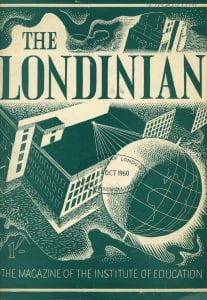Events
Students During and After the Great War
National Army Museum, 8 November 2024, 12-1pm
Free, but please book here: Students During and After the Great War | National Army Museum (nam.ac.uk)
Young people fought and fell in unprecedented numbers during the First World War (1914-18). In this talk, Georgina Brewis and Daniel Laqua will focus on one group of young people, namely university students, highlighting the effect that the conflict had on their lives.
Volunteering and conscription had a drastic impact on the size and nature of student cohorts. After 1918, universities were transformed by an influx of ex-servicemen, and new funding arrangements enabled students from a wider range of backgrounds to attend university.
The talk will emphasise the arrangements for, and perspectives of, the ex-service students, drawing on research from the National Archives and six different higher education institutions.
Since 2017, Brewis and Laqua have jointly run a number of projects on student life in the aftermath of the First World War, thanks to funding from the Arts and Humanities Research CounciL (AHRC), the Society for Educational Studies (SES) and the British Educational Research Association (BERA).
About the speakers
Georgina Brewis
Georgina Brewis is a Professor of Social History at the Institute of Education at UCL. She is a social historian of higher education, voluntary action and humanitarianism in the 19th and 20th centuries.
Daniel Laqua
Daniel Laqua is a historian of modern and contemporary Europe and is an Associate Professor at Northumbria University. His research concerns the movements and organisations whose activities transcended national boundaries, such as socialists, anarchists, pacifists, humanitarians, student activists and anti-racist campaigners.
Generation UCL Exhibition, open until 8 December 2024

‘There is no university without its students.’
This is the concept at the heart of a new exhibition, ‘Generation UCL: 200 Years of Student Life in London’, which opens in UCL’s Octagon Gallery this week. The exhibition portrays students as foundational to the story of UCL, exploring their experiences over time and reassessing students’ impact on UCL’s almost 200-year history.
The exhibition also explores the formation of Students’ Union UCL, now one of the largest student-led organisations in the world. UCL students played important roles in building a wider student movement in Britain, helping found organisations including the National Union of Students, the West African Students’ Union and the Central Union of Chinese Students.
UCL’s President and Provost Dr Michael Spence said: “This important exhibition marks the start of UCL’s countdown to our 200th birthday in 2026. It offers new insights into our diverse and lively community of students over time, exploring how they have made a home with us over 200 years. Opening just as UCL is named The Times and Sunday Times ‘University of the Year’ and as we launch a new campus on Queen Elizabeth Olympic Park in east London, the exhibition offers inspiration from our extraordinary past to help shape our future.”
Curated by Professor Georgina Brewis and Dr Sam Blaxland (both IOE, UCL’s Faculty of Education and Society) alongside Leah Johnston and Colin Penman (UCL Special Collections), the exhibition includes many items from UCL collections and alumni loans or donations that have never been displayed before. The exhibition forms part of a wider research and engagement project, Generation UCL, that looks to turn institutional history upside down and present the first students as the real ‘founders’ of UCL.
Professor Georgina Brewis, Director of the Generation UCL project and lead curator of the exhibition, said: “As London’s first university, students at UCL invented what it was like to be a student in the capital and we’ve worked hard to represent the diversity of student life over two centuries. The exhibition showcases UCL’s rich collections of archive material and objects covering student life, including new acquisitions of clothing, memorabilia and scrapbooks loaned or donated by alumni. This allows us to spotlight individual stories whilst also exploring the collective activities of students over time.”
The exhibition also features recorded accounts from alumni reflecting on key moments during their time at UCL, including the separate spaces for men and women on campus in the 1880s, the experience of studying at UCL after the Second World War, and the founding of the UK’s first GaySoc in 1972. Visitors are invited to contribute to this growing oral history archive by sharing their memories of their time at UCL and life after graduation.
The exhibition encourages visitors to think critically about UCL’s history in the run-up to its bicentenary in 2026 and the key role played by students in that remarkable story.
‘Generation UCL: 200 Years of Student Life in London’ is now open in the UCL Octagon Gallery and will run until 18 August 2024.
 Close
Close



